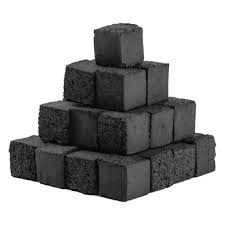ONE CHARCOAL- Mitigating GBV and Climate Change.
Molds of Charcoal briquettes PC: Grand Royal Coco
By: Zainab Yetunde Adam
"I want to buy charcoal," says a customer who approached Aishatu Abdulrahman in her shop in Maiduguri one hot and dry afternoon. This is a common request that Mrs. Abdulrahman receives.
Recently, she has appeared much happier because she was taught how to produce and use charcoal briquettes using fecal sludge as a means of protecting the environment.
"Borno State Environmental Protection Agency (BOSEPA) trained us on how to convert waste or refuse into a useful product such as charcoal briquettes to prevent environmental pollution, flooding, deforestation, desertification, and mitigate climate change."
Millions of lives are at risk due to the urgent threat of climate change, and sub-Saharan African dry areas like Mrs Abdulrahman’s Maiduguri, northeastern Nigeria, are some of the worst impacted. However, there are ways to address this issue, such as changing energy sources and protecting forests, which are critical carbon sinks. Each country must find its own solutions to deal with the uncertainties of climate change and adopt low-carbon growth and emissions reduction strategies.
A 2014 World Bank report on Climate change posits that while these solutions may differ from country to country, every nation has the potential to implement them.
According to Mrs Abdulrahman, they use sawdust, and cow dung to mold the charcoal briquettes.
She said BOSEPA is looking into how they can use remnants of sugar cane, groundnut shell, and maize chaff as well.
"Right now, inside my house, I can make a few or a little for my personal use locally, but I cannot make it in large quantities because I do not have a production machine nor a spacious place to prepare and dry. If I am able to get a machine for production, it will help me and the larger society earn a living because charcoal briquettes are sustainable."
Mrs Abdulrahman is not the only trainee who appreciates the new skill she has.
Hadiza Kassim and Hadiza Ibrahim shared similar experiences.
According to these women, accessing sawdust (one of the materials needed) becomes difficult as the sellers hike the price of a small sack from N1500 to N3000, thereby hindering their output. They also lack a start-up capital and a Briquette production machine.
To Hadiza Kassim, the initiative has protected them from becoming victims of violence, and GBV, and encountering perceived threats in bushes.
"With this charcoal, one doesn't need to go to the Bush in search of firewood and risk being captured by insurgents, get raped, or experience other forms of violence."
Additionally, some of the trainees in Hausari community previously pooled their funds to produce large quantities of goods and share them, but they stopped doing so because they did not receive all of the materials required for production. Twenty out of the 100 the trainees from this community stepped down their knowledge to their community members, bringing them to a total of 40 to 50 charcoal briquette makers in this community alone. To avoid halting the initiative, they jointly require financial support for maximum productivity.
How sustainable is the initiative?
Norwegian Church Aid (NCA), in collaboration with the Borno State Environmental Protection Agency (BOSEPA), introduced the production and use of Charcoal briquettes in July 2022 to empower women and keep them safe from searching for firewood in bushes, while also preventing deforestation in conflict-ravaged Borno. The initiative targeted 100 participants at the onset.
Esther John, a Senior Water, Sanitation, and Hygiene (WASH) Officer with the NCA, stated that climate change is a global issue that affects us, particularly deforestation and other activities that contribute to global warming, among other issues.
Mrs. John explained that NCA and BOSEPA implemented a pilot project focusing on climate change with a specific action of sanitation through fecal sludge management, job creation, and reducing women and girls' exposure to GBV.
"50-70% of houses use charcoal in Borno State for cooking and other domestic activities, thereby becoming an object of necessity," she said.
Plus, the Director of Environment at BOSEPA, Aisha Hamza, noted that the charcoal briquettes are safe and easy to use by every individual.
"Producing this will also prevent vectors and microorganisms that harbors or lay their eggs on waste materials when the waste is not left around."
Mrs Hamza encouraged women to use it instead of cutting down trees for firewood.
"Unlike regular charcoal, charcoal briquettes are healthier for humans and do not burn as quickly when used for cooking."
BOSEPA and NCA are eager to enhance the skills and capabilities of women and youth in this initiative. This will not only provide them with a source of income, but it will also help to mitigate the effects of climate change. The production and use of briquettes will help to reduce or stop tree cutting as people become more aware of their benefits and demand for them increases.
This report is supported by African Activists for Climate Justice, Education as a Vaccine, and The African Women's Development and Communication Network.





Comments
Post a Comment